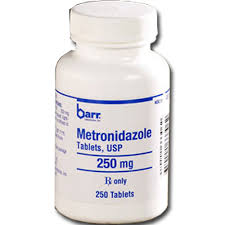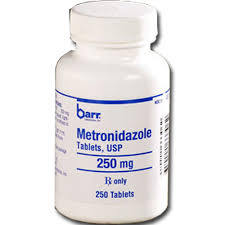Providing Quality & Trust || Clinic Website
Detailed Description
Metronidazole
(me-troe-ni-da-zole)
- Description: Antibiotic, Antiprotozoal
- Other Names for this Medication: Flagyl®
- Common Dosage Forms: Veterinary: None.
Topical gel and injectable formulations are also available.
Give this medication with food.
This drug can cause nervous system side effects, especially when administered at higher doses. Tell your veterinarian about any changes in your animal’s behavior or coordination.
Do not give to pregnant or nursing animals.
Banned for use in animals that are used for food (including egg laying chickens and dairy animals).
Pregnant women and people who are allergic to this drug should be very careful notto accidentally take it.
What is Metronidazole?
Metronidazole is an antibiotic that can treat or prevent some bacterial and protozoal (eg, Giardia spp) infections.
- The FDA has approved this drug for use in humans but it is not officially approved for use in animals.
- The FDA allows veterinarians to prescribe and use human products containing this drug in animals in certain situations.
- The FDA bans (itis illegal) using this drug in food animals.
You and your veterinarian can discuss why this drug is the most appropriate choice.
Uses/Indications:
Although there are no veterinary-approved metronidazole products, the drug has been used extensively in the treatment of Giardia spp in both dogs and cats, although it is not the drug of choice. It is also used clinically in small animals for the treatment of other parasites (Trichomonas spp and Balantidium coli), as well as for treating both enteric and systemic anaerobic infections. It is sometimes used as a perioperative surgical prophylaxis antibiotic where anaerobes are likely (eg, colon, periodontal tissues).
In horses, metronidazole has been used clinically for the treatment of systemic and enteric anaerobic infections.
The World Health Organization (WHO) has designated metronidazole as an Important antimicrobial for human medicine.
Side effects that usually are not serious include:
- Nausea, vomiting, regurgitation, drooling.
- Diarrhea or if treating diarrhea it worsens.
- Weakness or tiredness.
- Humans report a bad taste in the mouth while taking metronidazole.
If any of these signs are severe, worsen or continue to be a problem, contact your veterinarian.
Side effects that may be serious or indicate a serious problem:
- Nervous system toxicity (staggering, difficulty walking, loss of coordination, head tilt, eye twitching, seizures).
- These side effects usually don’t occur unless metronidazole is given at high doses or if it is given for a long time, but they can happen with lower doses at any time.
- Loss of appetite.
- Yellow color to the whites of the eyes or gums (jaundice).
If you see any of these signs, contact your veterinarian immediately.
If you have any other questions about this medication, contact your veterinarian or pharmacist.
Precautions/Warnings:
Metronidazole is prohibited for use in food animals by the FDA.
Metronidazole is contraindicated in animals hypersensitive to it or nitroimidazole derivatives. It has been recommended not to use the drug in severely debilitated, pregnant, or nursing animals. Metronidazole should be used with caution in animals with hepatic dysfunction. If the drug must be used in animals with significant liver impairment, the total daily dose should be reduced to the standard antianaerobe dose and adminisitered once daily.
Neurotoxicity is a concern, particularly at high doses. In dogs, total daily doses of metronidazole should not exceed 60 mg/kg. However, the median dosage identified in a more recent retrospective study of 26 dogs with metronidazole neurotoxicity was 21 mg/kg every 12 hours. The primary clinical signs were cerebellovestibular ataxia (85%) and pathologic nystagmus (50%), and the median time to resolution was 3 days after metronidazole discontinuation. In a separate case report, neurologic status improved rapidly within 72 hours after discontinuation of high-dose (65 mg/kg/day) oral metronidazole.
Metronidazole use (25 mg/kg PO twice daily) resulted in degradation in the ability to detect odors in 50% of explosives detection dogs. Further studies are required to determine if lower metronidazole dosage would have the same effect.
Metronidazole tablets have a sharp, metallic taste that animals find unpleasant. Placing in capsules or using compounded oral suspensions may alleviate avoidance.
Powered by nopCommerce
This site is running in live payment mode. Real payments will be processed.

